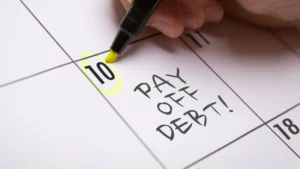Ever feel like everyone’s got it together, except you? One mate’s into crypto, another’s saving for a house, and someone else has just launched a business. Meanwhile, you’re juggling bills, watching payday creep closer and wondering how you’re supposed to “build wealth” when your biggest achievement so far is opening a savings account.
Here’s something you might not know: most of our attitudes towards money are set by the age of seven. Whether it’s scarcity or security, saving or spending, so much of what we believe about money comes from childhood. And unless we take the time to challenge those beliefs, we risk dragging them into adulthood.
As Joseph Broadfield, a former headteacher and advisor at St. James’s Place and Financial Adviser of Men’s Prosperity Club, points out, financial stress can affect families in deeper ways than we realise. It touches everything—not just your bank account, but your mental health, your relationships, even your children’s performance at school. Children are more perceptive than we often realise and the financial worries of parents trickle down in ways we may not fully grasp.
Managing money in your 20s isn’t just about what’s in your account. It’s about headspace, confidence and peace of mind. The good news? You don’t need to wait for a big payday to take control. It starts with habits, not instant wealth.

1. Stop Comparing, Start Planning
We live in a world of constant comparison. Everyone’s Instagram is full of flashy cars, dream vacations, motivational quotes and highlight reels. But, the truth is, most of that is surface-level. Real financial security isn’t built overnight or flaunted on social media; it’s built quietly, with intentional steps that might not always make headlines.
The trick is to stop comparing yourself to others and start comparing where you are now to where you want to be in five or ten years. Ask yourself:
- Where do I want to be financially in five or ten years?
- What would make me feel secure, not just look successful?
When you set financial goals based on what actually matters to you—not on what others are doing—you can build a roadmap that’s uniquely yours. Whether you’re clearing debt, saving for a house or starting a side hustle, planning isn’t just for corporate execs in suits. It’s for you, no matter where you’re starting from.
The sooner you begin planning, the more control you’ll feel over your financial future. Start with small steps: list your goals, create a budget and track your spending. The earlier you plan, the more peace of mind you’ll have in the long run.

2. Financial Stress is Real. Don’t Brush It Off
Financial stress is one of the most common challenges facing men in their 20s. You might not always talk about it, but the anxiety over money impacts your sleep, your confidence, and your relationships. It can feel like a weight that’s always there, lurking in the background.
But here’s the thing: financial stress doesn’t have to be your reality. Budgeting and planning aren’t just about spreadsheets; they’re about gaining control over your money and your mindset. The more control you feel over your finances, the less power stress will have over you.
Don’t wait for big paydays or financial windfalls to feel like you’re on track. Even small wins help shift your mindset:
- Paying off a credit card
- Setting up a £50 monthly savings transfer
- Checking your bank balance without flinching
Remember, it’s not about perfection. It’s about progress. Every little bit of effort you make towards financial stability contributes to building a stronger foundation for the future.
![]()
3. Build Habits, Not Hype
One of the biggest myths about personal finance is that there’s a “quick fix” or “money hack” that will suddenly make everything fall into place. In reality, the key to financial success is boring consistency. There’s no shortcut. But the good news is, small, consistent steps add up over time.
Here’s how you can start building good money habits:
Track your spending
Use an app or a notebook to track your daily, weekly and monthly expenses. This will help you spot areas where you’re overspending and where you can cut back.
Set a weekly check-in
Make it a habit to review your finances once a week. Adjust your budget, check your spending and make sure you’re on track to meet your goals.
Automate your savings
Even if you can only save £10 a week, setting up automatic transfers to a savings account ensures you save consistently. It’s like paying yourself first.
Keep learning
Whether it’s podcasts, books, videos or chatting with financially-savvy people you trust, continuous learning about money can help keep you motivated and informed.
Financial habits should be as routine as going to the gym or meal prepping for the week. Your future self will thank you for taking the time now to build good financial habits. And before you know it, those habits will lead to a healthier financial future.

4. Protect Your Mind and Your Money
Life doesn’t always go as planned. Unexpected events can knock you off course, both financially and emotionally. Whether it’s an emergency, a health issue, or a job loss, having a solid financial foundation can help you weather the storm.
Here are a few steps you can take to protect both your mental health and your finances:
Build an emergency fund
Aim to have at least three months’ worth of living expenses saved in case of an unexpected event. This fund is your safety net.
Look into insurance
If someone depends on you, consider income protection or life insurance. It’s a small investment in your future security.
Prioritise your mental health
Financial stress can take a toll on your mental well-being. Don’t hesitate to seek support from a professional if needed. Your mental health is just as important as your financial health.
This isn’t about chasing riches or living in fear of the unexpected. It’s about building resilience. A strong financial foundation and a healthy mindset give you the power to recover from whatever life throws your way.

5. Don’t Try to Do It All Alone
In our culture, men often keep things to themselves, whether it’s personal struggles or financial worries. But here’s the thing: you don’t have to figure out everything on your own. Just like you’d consult a physio if you pulled a muscle or call a mechanic if your car broke down, it’s okay to seek financial advice when you need it.
Where to get help:
- Financial advisers: Many offer free consultations and can help you create a financial plan tailored to your goals.
- Trusted friends or family: Talk to someone you trust about your financial situation. Sometimes just talking things out can provide clarity.
- Online communities: Join forums or social media groups where people share financial tips and experiences. You’ll learn a lot and build a support network.
Remember, you don’t need to know everything about personal finance right now. But starting the conversation and seeking advice is a crucial first step. You don’t have to figure it all out alone.
Final Thought: Design Your Own Life
The reality is, you don’t need a six-figure income to feel financially secure. You don’t have to live like a monk or sacrifice everything. What you need is a financial plan that fits your values, goals and lifestyle.
Your 20s are the perfect time to get intentional about your money, mindset and future. It’s the time to start building habits that will set you up for success in the years ahead. The most important thing is that you start now, no matter where you are on your financial journey.
Your financial wellbeing is tied directly to your overall wellbeing. It’s never too early to start looking after both.
One step at a time. You’ve got this.




